- Home
- Wilkie Collins
Miss or Mrs.? Page 8
Miss or Mrs.? Read online
Page 8
EIGHTH SCENE.
The Library.
The next day Sir Joseph Graybrooke, Sir Joseph's lawyer, Mr. Dicas(highly respectable and immensely rich), and Richard Turlington wereassembled in the library at Muswell Hill, to discuss the question ofNatalie's marriage settlement.
After the usual preliminary phrases had been exchanged, Sir Josephshowed some hesitation in openly approaching the question which thelittle party of three had met to debate. He avoided his lawyer's eye;and he looked at Turlington rather uneasily.
"Richard," he began at last, "when I spoke to you about your marriage,on board the yacht, I said I would give my daughter--" Either hiscourage or his breath failed him at that point. He was obliged to wait amoment before he could go on.
"I said I would give my daughter half my fortune on her marriage," heresumed. "Forgive me, Richard. I can't do it!"
Mr. Dicas, waiting for his instructions, laid down his pen and looked atSir Joseph's son-in-law elect. What would Mr. Turlington say?
He said nothing. Sitting opposite the window, he rose when Sir Josephspoke, and placed himself at the other side of the table, with his backto the light.
"My eyes are weak this morning," he said, in an unnaturally low tone ofvoice. "The light hurts them."
He could find no more plausible excuse than that for concealing his facein shadow from the scrutiny of the two men on either side of him. Thecontinuous moral irritation of his unhappy courtship--a courtship whichhad never advanced beyond the frigid familiarity of kissing Natalie'shand in the presence of others--had physically deteriorated him. Even_his_ hardy nerves began to feel the long strain of suspicion thathad been laid unremittingly on them for weeks past. His power ofself-control--he knew it himself--was not to be relied on. He could hidehis face: he could no longer command it.
"Did you hear what I said, Richard?"
"I heard. Go on."
Sir Joseph proceeded, gathering confidence as he advanced.
"Half my fortune!" he repeated. "It's parting with half my life; it'ssaying good-by forever to my dearest friend! My money has been such acomfort to me, Richard; such a pleasant occupation for my mind. I knowno reading so interesting and so instructive as the reading of one'sBanker's Book. To watch the outgoings on one side," said Sir Joseph,with a gentle and pathetic solemnity, "and the incomings on theother--the sad lessening of the balance at one time, and the cheeringand delightful growth of it at another--what absorbing reading! The bestnovel that ever was written isn't to be mentioned in a breath with it.I can not, Richard, I really can _not_, see my nice round balance shrinkup to half the figure that I have been used to for a lifetime. It maybe weak of me," proceeded Sir Joseph, evidently feeling that it was notweak of him at all, "but we all have our tender place, and my Banker'sBook is mine. Besides, it isn't as if you wanted it. If you wanted it,of course--but you don't want it. You are a rich man; you aremarrying my dear Natalie for love, not for money. You and she and mygrandchildren will have it all at my death. It _can_ make no differenceto you to wait a few years till the old man's chair at the firesideis empty. Will you say the fourth part, Richard, instead of the half?Twenty thousand," pleaded Sir Joseph, piteously. "I can bear twentythousand off. For God's sake don't ask me for more!"
The lips of the lawyer twisted themselves sourly into an ironical smile.He was quite as fond of his money as Sir Joseph. He ought to have feltfor his client; but rich men have no sympathy with one another. Mr.Dicas openly despised Sir Joseph.
There was a pause. The robin-redbreasts in the shrubbery outside musthave had prodigious balances at their bankers; they hopped up on thewindow-sill so fearlessly; they looked in with so little respect at thetwo rich men.
"Don't keep me in suspense, Richard," proceeded Sir Joseph. "Speak out.Is it yes or no?"
Turlington struck his hand excitedly on the table, and burst out on asudden with the answer which had been so strangely delayed.
"Twenty thousand with all my heart!" he said. "On this condition,Graybrooke, that every farthing of it is settled on Natalie, and on herchildren after her. Not a half-penny to me!" he cried magnanimously, inhis brassiest tones. "Not a half-penny to me!"
Let no man say the rich are heartless. Sir Joseph seized hisson-in-law's hand in silence, and burst into tears.
Mr. Dicas, habitually a silent man, uttered the first two words that hadescaped him since the business began. "Highly creditable," he said, andtook a note of his instructions on the spot.
From that point the business of the settlement flowed smoothly on to itsdestined end. Sir Joseph explained his views at the fullest length, andthe lawyer's pen kept pace with him. Turlington, remaining in hisplace at the table, restricted himself to a purely passive part in theproceedings. He answered briefly when it was absolutely necessary tospeak, and he agreed with the two elders in everything. A man has noattention to place at the disposal of other people when he stands ata crisis in his life. Turlington stood at that crisis, at the tryingmoment when Sir Joseph's unexpected proposal pressed instantly for areply. Two merciless alternatives confronted him. Either he must repaythe borrowed forty thousand pounds on the day when repayment was due,or he must ask Bulpit Brothers to grant him an extension of time, and soinevitably provoke an examination into the fraudulent security depositedwith the firm, which could end in but one way. His last, literally hislast chance, after Sir Joseph had diminished the promised dowry by onehalf, was to adopt the high-minded tone which became his position, andto conceal the truth until he could reveal it to his father-in-law inthe privileged character of Natalie's husband. "I owe forty thousandpounds, sir, in a fortnight's time, and I have not got a farthing ofmy own. Pay for me, or you will see your son-in-law's name in theBankrupt's List." For his daughter's sake--who could doubt it?--SirJoseph would produce the money. The one thing needful was to be marriedin time. If either by accident or treachery Sir Joseph was led intodeferring the appointed day, by so much as a fortnight only, the fatal"call" would come, and the firm of Pizzituti, Turlington & Branca wouldappear in the Gazette.
So he reasoned, standing on the brink of the terrible discovery whichwas soon to reveal to him that Natalie was the wife of another man.
"Richard!"
"Mr. Turlington!"
He started, and roused his attention to present things. Sir Joseph onone side, and the lawyer on the other, were both appealing to him, andboth regarding him with looks of amazement.
"Have you done with the settlement?" he asked.
"My dear Richard, we have done with it long since," replied Sir Joseph."Have you really not heard what I have been saying for the last quarterof an hour to good Mr. Dicas here? What _can_ you have been thinkingof?"
Turlington did not attempt to answer the question. "Am I interested," heasked, "in what you have been saying to Mr. Dicas?"
"You shall judge for yourself," answered Sir Joseph, mysteriously; "Ihave been giving Mr. Dicas his instructions for making my Will. I wishthe Will and the Marriage-Settlement to be executed at the same time.Read the instructions, Mr. Dicas."
Sir Joseph's contemplated Will proved to have two merits--it was simpleand it was short. Excepting one or two trifling legacies to distantrelatives, he had no one to think of (Miss Lavinia being alreadyprovided for) but his daughter and the children who might be born of hermarriage. In its various provisions, made with these two main objectsin view, the Will followed the precedents established in such cases.It differed in no important respect from the tens of thousands of otherwills made under similar circumstances. Sir Joseph's motive in claimingspecial attention for it still remained unexplained, when Mr. Dicasreached the clause devoted to the appointment of executors and trustees;and announced that this portion of the document was left in blank.
"Sir Joseph Graybrooke, are you prepared to name the persons whom youappoint?" asked the lawyer.
Sir Joseph rose, apparently for the purpose of giving special importanceto the terms in which he answered his lawyer's question.
"I appoint," he said
, "as sole executor and trustee--RichardTurlington."
It was no easy matter to astonish Mr. Dicas. Sir Joseph's replyabsolutely confounded him. He looked across the table at his client anddelivered himself on this special occasion of as many as three words.
"Are you mad?" he asked.
Sir Joseph's healthy complexion slightly reddened. "I never was in morecomplete possession of myself, Mr. Dicas, than at this moment."
Mr. Dicas was not to be silenced in that way.
"Are you aware of what you do," persisted the lawyer, "if you appointMr. Turlington as sole executor and trustee? You put it in the power ofyour daughter's husband, sir, to make away with every farthing of yourmoney after your death."
Turlington had hitherto listened with an appearance of interest in theproceedings, which he assumed as an act of politeness. To his view, thefuture was limited to the date at which Bulpit Brothers had a right toclaim the repayment of their loan. The Will was a matter of no earthlyimportance to him, by comparison with the infinitely superior interestof the Marriage. It was only when the lawyer's brutally plain languageforced his attention to it that the question of his pecuniary interestin his father-in-law's death assumed its fit position in his mind.
_His_ color rose; and _he_ too showed that he was offended by what Mr.Dicas had just said.
"Not a word, Richard! Let me speak for you as well as for myself," saidSir Joseph. "For seven years past," he continued, turning to the lawyer,"I have been accustomed to place the most unlimited trust in RichardTurlington. His disinterested advice has enabled me largely to increasemy income, without placing a farthing of the principal in jeopardy. Onmore than one occasion, I have entreated him to make use of my moneyin his business. He has invariably refused to do so. Even his bitterestenemies, sir, have been obliged to acknowledge that my interests weresafe when committed to his care. Am I to begin distrusting him, nowthat I am about to give him my daughter in marriage? Am I to leave it onrecord that I doubt him for the first time--when my Will is opened aftermy death? No! I can confide the management of the fortune which my childwill inherit after me to no more competent or more honorable hands thanthe hands of the man who is to marry her. I maintain my appointment, Mr.Dicas! I persist in placing the whole responsibility under my Will in myson-in-law's care."
Turlington attempted to speak. The lawyer attempted to speak. SirJoseph--with a certain simple dignity which had its effect on both ofthem--declined to hear a word on either side. "No, Richard! as long asI am alive this is my business, not yours. No, Mr. Dicas! I understandthat it is your business to protest professionally. You have protested.Fill in the blank space as I have told you. Or leave the instructions onthe table, and I will send for the nearest solicitor to complete them inyour place."
Those words placed the lawyer's position plainly before him. He had nochoice but to do as he was bid, or to lose a good client. He did as hewas bid, and grimly left the room.
Sir Joseph, with old-fashioned politeness, followed him as far asthe hall. Returning to the library to say a few friendly words beforefinally dismissing the subject of the Will, he found himself seized bythe arm, and dragged without ceremony, in Turlington's powerful grasp,to the window.
"Richard!" he exclaimed, "what does this mean?"
"Look!" cried the other, pointing through the window to a grassy walkin the grounds, bounded on either side by shrubberies, and situated at alittle distance from the house. "Who is that man?--quick! before we losesight of him--the man crossing there from one shrubbery to the other?"Sir Joseph failed to recognize the figure before it disappeared.Turlington whispered fiercely, close to his ear--"Launcelot Linzie!"
In perfect good faith Sir Joseph declared that the man could notpossibly have been Launce. Turlington's frenzy of jealous suspicion wasnot to be so easily calmed. He asked significantly for Natalie. She wasreported to be walking in the grounds. "I knew it!" he said, withan oath--and hurried out into the grounds to discover the truth forhimself.
Some little time elapsed before he came back to the house. He haddiscovered Natalie--alone. Not a sign of Launce had rewarded his search.For the hundredth time he had offended Natalie. For the hundredth timehe was compelled to appeal to the indulgence of her father and her aunt."It won't happen again," he said, sullenly penitent. "You will find mequite another man when I have got you all at my house in the country.Mind!" he burst out, with a furtive look, which expressed his inveteratedistrust of Natalie and of every one about her. "Mind! it's settledthat you all come to me in Somersetshire, on Monday next." Sir Josephanswered rather dryly that it was settled. Turlington turned to leavethe room--and suddenly came back. "It's understood," he went on,addressing Miss Lavinia, "that the seventh of next month is the datefixed for the marriage. Not a day later!" Miss Lavinia replied, ratherdryly on her side, "Of course, Richard; not a day later." He muttered,"All right" and hurriedly left them.
Half an hour afterward Natalie came in, looking a little confused.
"Has he gone?" she asked, whispering to her aunt.
Relieved on this point, she made straight for the library--a room whichshe rarely entered at that or any other period of the day. Miss Laviniafollowed her, curious to know what it meant. Natalie hurried to thewindow, and waved her handkerchief--evidently making a signal to someone outside. Miss Lavinia instantly joined her, and took her sharply bythe hand.
"Is it possible, Natalie?" she asked. "Has Launcelot Linzie really beenhere, unknown to your father or to me?"
"Where is the harm if he has?" answered Natalie, with a sudden outbreakof temper. "Am I never to see my cousin again, because Mr. Turlingtonhappens to be jealous of him?"
She suddenly turned away her head. The rich color flowed over her faceand neck. Miss Lavinia, proceeding sternly with the administrationof the necessary reproof, was silenced midway by a new change in herniece's variable temper. Natalie burst into tears. Satisfied with thisappearance of sincere contrition, the old lady consented to overlookwhat had happened; and, for this occasion only, to keep her niece'ssecret. They would all be in Somersetshire, she remarked, before anymore breaches of discipline could be committed. Richard had fortunatelymade no discoveries; and the matter might safely be trusted, all thingsconsidered, to rest where it was.
Miss Lavinia might possibly have taken a less hopeful view of thecircumstances, if she had known that one of the men-servants at MuswellHill was in Richard Turlington's pay, and that this servant had seenLaunce leave the grounds by the back-garden gate.

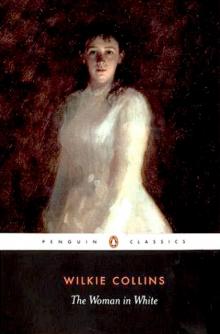 The Woman in White
The Woman in White The Queen of Hearts
The Queen of Hearts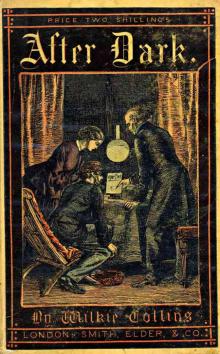 Miss Jeromette and the Clergyman
Miss Jeromette and the Clergyman Man and Wife
Man and Wife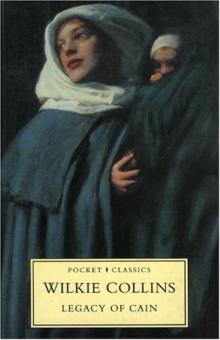 The Legacy of Cain
The Legacy of Cain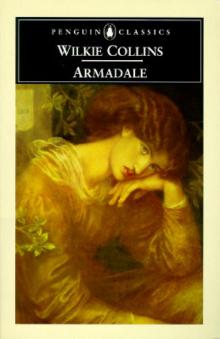 Armadale
Armadale The Frozen Deep
The Frozen Deep John Jago's Ghost or the Dead Alive
John Jago's Ghost or the Dead Alive Poor Miss Finch
Poor Miss Finch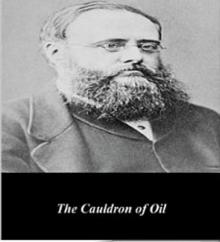 The Cauldron of Oil: A Case Worth Looking At
The Cauldron of Oil: A Case Worth Looking At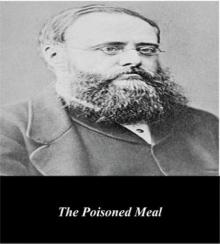 The Poisoned Meal
The Poisoned Meal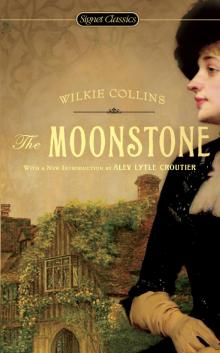 The Moonstone
The Moonstone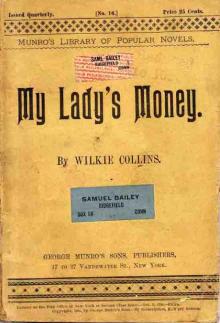 My Lady's Money
My Lady's Money Classic Ghost Stories
Classic Ghost Stories Jezebel's Daughter
Jezebel's Daughter The Devil's Spectacles
The Devil's Spectacles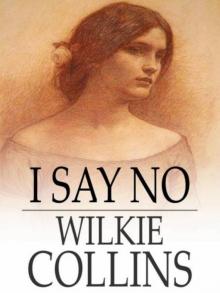 I Say No
I Say No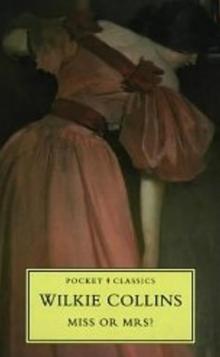 Miss or Mrs.?
Miss or Mrs.?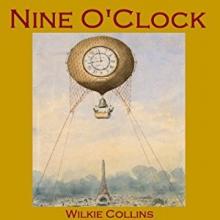 Nine O'Clock
Nine O'Clock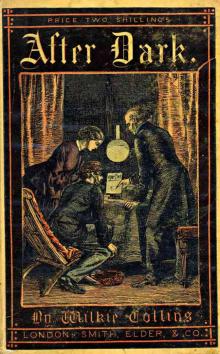 The Lawyer's Story of a Stolen Letter
The Lawyer's Story of a Stolen Letter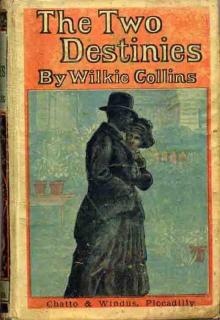 The Two Destinies
The Two Destinies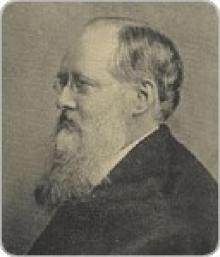 Mr. Percy and the Prophet
Mr. Percy and the Prophet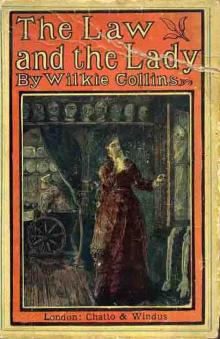 The Law and the Lady
The Law and the Lady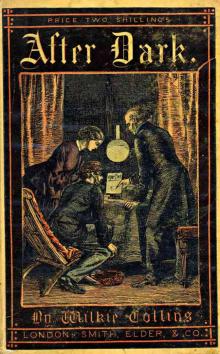 The Nun's Story of Gabriel's Marriage
The Nun's Story of Gabriel's Marriage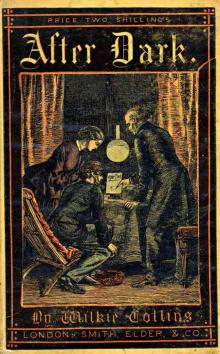 After Dark
After Dark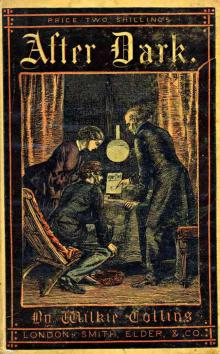 Mr. Captain and the Nymph
Mr. Captain and the Nymph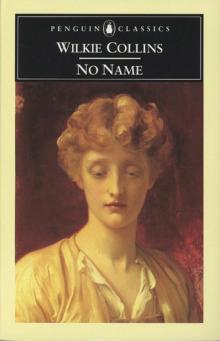 No Name
No Name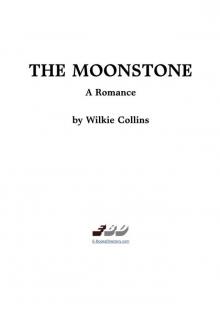 The Moonstone (Penguin Classics)
The Moonstone (Penguin Classics) Antonina
Antonina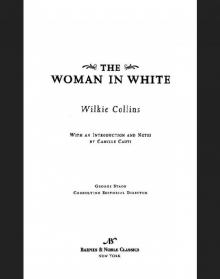 Woman in White (Barnes & Noble Classics Series)
Woman in White (Barnes & Noble Classics Series)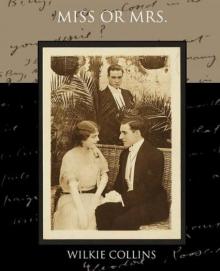 Miss or Mrs
Miss or Mrs The Dead Alive
The Dead Alive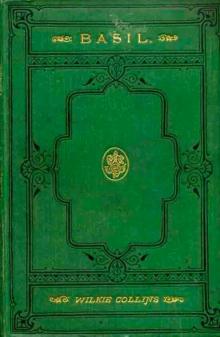 Basil
Basil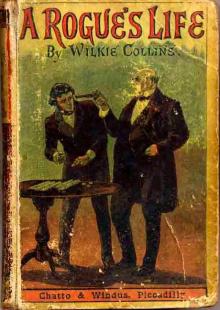 A Rogue's Life
A Rogue's Life The New Magdalen
The New Magdalen Blind Love
Blind Love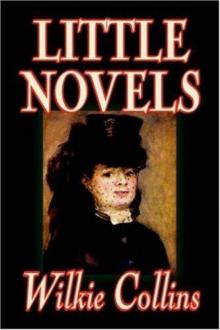 Little Novels
Little Novels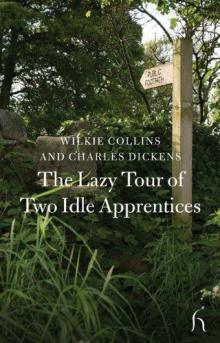 The Lazy Tour of Two Idle Apprentices
The Lazy Tour of Two Idle Apprentices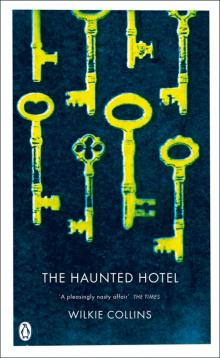 The Haunted Hotel
The Haunted Hotel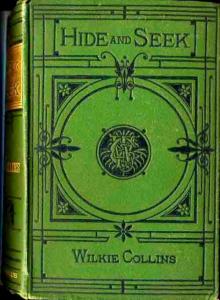 Hide and Seek
Hide and Seek